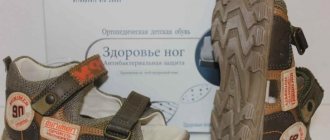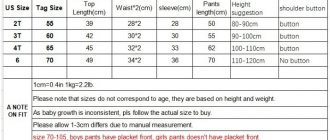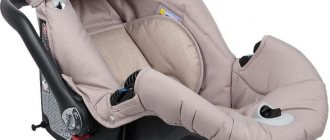home
Articles
Diagnostics
Kharitonova Marina Alekseevna
Chief physician, pediatrician, member of the Union of Pediatricians of Russia
02.06.2020
Neonatal screening is an examination of a baby for five hereditary diseases that pose a serious threat to the life and health of the child.
The examination is carried out for such diseases as: congenital hypothyroidism, cystic fibrosis, phenylketonuria, adrenogenital syndrome, galactosemia. Early detection of these diseases allows the doctor to prescribe the necessary further examination, treatment or a specialized diet in a timely manner.
Neonatal newborn screening: a test that saves lives
At the Moscow Neonatal Screening Center, operating at the Morozov Children's Hospital, every year more than 100,000 newborns are diagnosed for severe hereditary diseases.
The study includes testing for 11 congenital diseases: cystic fibrosis, galactosemia, congenital adrenal dysfunction, congenital hypothyroidism, phenylketonuria, glutaric aciduria type 1, tyrosinemia type 1, leucinosis, methylmalonic/propionic aciduria, biotinidase deficiency, medium-chain acyl-CoA dehydrogenase fat deficiency acids.
“The absence of relatives with congenital and hereditary pathologies, unfortunately, does not guarantee the birth of a healthy child, so it is important that parents do not refuse to conduct research. Hereditary diseases pose a serious threat to the health and life of children. Thanks to early diagnosis and timely treatment, your child can be helped to cope with the severe manifestations of the disease. The earliest way to diagnose inborn errors of metabolism is neonatal screening of newborns. It allows you to identify a dangerous disease before symptoms appear, thereby preventing the development of life-threatening complications,” noted Tatyana Kekeyeva, head of the medical genetics department of the Morozov Children’s Hospital, geneticist.
According to the doctor, a blood test is collected from all newborns in the city’s maternity hospitals. Blood samples from the heel of children are taken after three full days from the moment of birth and sent for research to the Moscow Center for Neonatal Screening.
“If no signs of disease are detected, the test results are not sent either to the maternity hospital or to the parents of the newborn. If an increase in certain indicators is detected, the child is indicated for immediate re-analysis. If the indicators are exceeded in a repeated analysis, our employees contact the medical institution or the baby’s parents and invite them to undergo clarifying diagnostics,” said Tatyana Kekeyeva.
If the diagnosis is confirmed, a child with a hereditary disease is observed by a specialist at the Morozov Hospital until the age of 18. Patients are prescribed specialized medications and nutritional therapy, and subsidized prescriptions are issued.
The Moscow Neonatal Screening Center has been operating for more than five years. Here, data on all children born in Moscow with hereditary metabolic diseases is analyzed, which makes it possible to quickly identify the disease and promptly prescribe therapy.
In addition, the center’s specialists advise children in case of suspicion of another monogenic pathology, chromosomal disorders, and conduct family consultations in preparation for pregnancy and during pregnancy (assessment of the risks of developing diseases in the fetus).
Reception is carried out within the framework of compulsory medical insurance upon referral from the clinic at the place of residence (form 057/U-04), as well as within the framework of paid medical services. You can contact the center by phone, +7 (495) 959-87-74 and email
Mandatory tests
Eggworm test - how to test for a child under one year old
What mandatory tests are taken from a child at birth in the maternity hospital:
- Immediately after birth, blood is taken from the umbilical vein to detect HIV infection, syphilis, and hepatitis.
- If jaundice is detected, a liver transaminase test is performed.
- On days 2-3, anemia, insufficient thyroid function and phenylketonuria are detected.
- Blood samples are also taken to identify genetic pathologies, antibodies to cytomegalovirus, herpes, toxo- and mycoplasma, and chlamydia.
- Children who are at risk are subject to additional examinations: urine collection and additional blood testing.
It is important to carry out tests on the newborn to identify the presence of serious diseases in the infant.
Additionally, examinations are carried out:
- Check your hearing;
- Ultrasound examinations;
- Albucid is instilled into the eyes;
- Girls' genitals are also treated with Albucid.
Ultrasound of the heart of a baby
Vaccinations carried out in the maternity hospital include:
- BCG vaccination;
- vaccination against hepatitis C.
Personally, the doctor may prescribe a diet with glucose and an injection of vitamin K.
Ultrasound
Photo source: shutterstock.com
The next series of tests for babies occurs after discharge from the hospital. Now doctors will check the condition of the baby’s vital internal organs. In the first months of life, it is important to undergo four ultrasound examinations:
- Neurosonography, or ultrasound of the brain
- the most reliable way to check the structure and functioning of the contents of the child’s skull. In just a few minutes of examination, a doctor can identify a number of disorders. Ultrasound is performed through the large fontanelle, as well as through the lateral fontanelles at the temples and the opening at the base of the neck. This screening is prescribed to babies at about one and a half months. The main thing is to have time to do this before the year, because when the fontanelles close, it will be impossible to conduct neurosonography. The procedure is absolutely painless and safe for the baby.
- Ultrasound of the heart
;
- Ultrasound of the hip joints
– for timely detection of dysplasia, that is, disturbances in the correct formation of bones and joints. This diagnosis is increasingly being made to newborns, while its exact causes are not fully established. With dysplasia, the baby's legs vary in length, location of folds or size, and ultrasound shows the difference between the location of the joints in degrees, allowing dysplasia to be detected in the early stages. The defect in a newborn can be corrected with the help of massage, special gymnastics and orthopedic devices. Late-diagnosed disease is much more difficult to cure.
- Ultrasound of the abdominal organs
: liver, pancreas, kidneys, gall and bladder, spleen. Since it can be difficult for a doctor to examine some internal organs due to gases in the intestines, it is better to take the baby for an ultrasound one and a half, or preferably three, hours after feeding.
The cost of ultrasound examinations in the first months of a child’s life is included in the third coupon of the birth certificate. Research is being carried out in the direction of a pediatrician.
Scheduled tests for babies at 3 months
At two months, Igor and I, as expected, came to the clinic. While the doctor examined her son and admired how well “we” were eating and growing, the nurse was writing directions for tests. "For what? - I was surprised, “everything is fine with him.” It turns out that this is necessary. 3 months is a critical age. It is during this period that there is a risk of developing anemia. In addition, at this age, the toddler will have to be vaccinated - DTP and against polio. Before doing this, you need to make sure that the child has no pathologies. After all, vaccinations are given only to completely healthy children. You need to find out the level of hemoglobin in the blood, as well as the content of leukocytes, red blood cells and other components. For this, a general blood test is taken.
In addition, it is necessary to submit your urine for analysis. The analysis is also general. It will give information about whether the child’s kidneys and genitourinary system are in order. Any deviations will be noticeable by lowered or lowered readings. The color of the liquid, its transparency, pH level, as well as the amount of protein, sugar, and the content of leukocytes and red blood cells are important.
So, the baby, provided that the tests taken from him in the maternity hospital correspond to the norm, and also if the pediatrician has no “complaints” about his health, takes 2 tests:
- general blood analysis;
- and general urinalysis.
Referrals for these tests are usually issued at the second visit to the pediatrician, when the child is 2 months old. By three months, the test results should already be in your hands, so there is no need to delay going to the laboratory.
List of tests to identify allergens
According to recent studies, up to 15% of children in Russia suffer from various forms of allergic diseases: food allergies, bronchial asthma, skin rashes, neurodermatitis, hay fever, etc. Their symptoms are quite well known: persistent runny nose, sneezing, increased tearing, swelling and peeling on the skin. When these signs appear, the doctor prescribes tests to identify allergies.
In general, a predisposition to allergic reactions is indicated by increased production of immunoglobulin E (IgE) proteins, determined during a general blood test, and allergen tests make it possible to determine the specific type of pathogen.
So, the list of tests to identify allergens is as follows:
- general blood test (if the level of eosinophils in the child’s blood is elevated, this is an indication for a detailed examination for allergies);
- enzyme immunoassay blood test for total immunoglobulin E (total IgE, IgE total);
- allergy tests using various panels (food, respiratory, pediatric) containing the most common allergens.
Blood test for viruses in a child
Unfortunately, it is very easy to become infected with viral diseases, and the list of them is very wide. Children most often suffer from rubella, chickenpox, diphtheria, whooping cough, measles, scarlet fever, polio, meningitis, viral hepatitis, A, etc.
If a child has a sharp rise in temperature, symptoms of an upset stomach, dizziness, weakness and muscle pain, the child must urgently take a blood test for viruses.
The most common methods of testing for viruses in children are:
- Enzyme immunoassay blood test, which is done based on the presence of antibodies of classes M, G, A to the virus. ELISA can show the presence of infection both in the lymphatic system and elsewhere, as well as determine the stage of the disease. Using ELISA, acute viral hepatitis, mononucleosis, meningitis, giardiasis, cytomegalovirus and herpes virus infection are detected.
- PCR, or polymerase chain reaction method, which makes it possible to detect the presence of DNA of various viral infections with a high degree of accuracy. Using the PCR method, whooping cough, diphtheria and other viral diseases are diagnosed.
How to take blood from infants
Children's blood is taken from the ring finger. This is done in the morning. In some laboratories, instead of sharp metal “feathers”, special devices are provided specifically for infants, with the help of which blood is drawn without any pain at all. You can search for such a device via the Internet. It is rarely available in pharmacies. This is in case you go to get tested in a city laboratory, and not in a private clinic, where the equipment is usually modern. Surprisingly, when we arrived at the laboratory, not a single one of the babies that their mothers carried out of the blood collection room cried. As they say, what technology has come to! Tests can be taken without pain. Only older toddlers (three or four years old) were shouting in the queue, who already understood that they were not brought here to feed them ice cream. And the assurances that “it doesn’t hurt at all” had no effect on them. In general, donating blood with a baby, as it turned out, is even easier than with an older child. Mothers of babies are more worried than the little patients themselves.











